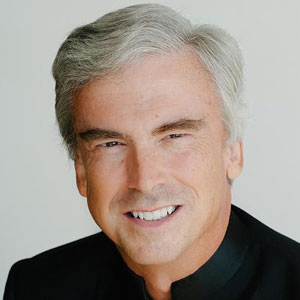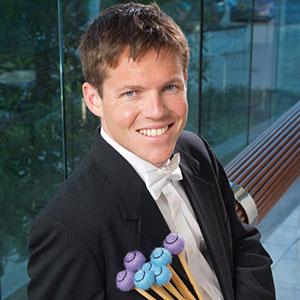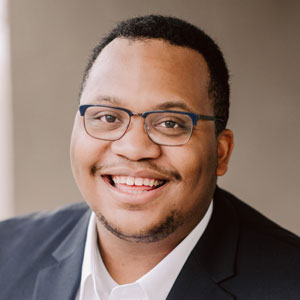IN STORM AND SUNSHINE
Tuesday, April 25, 2023, 7:30pm
Meyerson Symphony Center + Livestream
Jerry Junkin, Conductor & Artistic Director

In his 28th season as Artistic Director and Conductor of the Dallas Winds, Jerry Junkin is recognized as one of the world’s most highly regarded wind conductors. He has served as Music Director and Conductor of the Hong Kong Wind Philharmonia since 2003, and Principal Guest Conductor of the Senzoku Gakuen College of Music Wind Symphony in Tokyo since 2007. Additionally, 2021-2022 marks his 34th year on the faculty of The University of Texas at Austin, where he holds the Vincent R. and Jane D. DiNino Chair for the Director of Bands. There, he also holds the title of University Distinguished Teaching Professor. Previously, he served on the faculties of both the University of Michigan and the University of South Florida. In addition to his responsibilities as Professor of Music and Conductor of the Texas Wind Ensemble, he serves as Head of the Division of Conducting and Ensembles and teaches courses in conducting and wind band literature. He is a recipient of multiple teaching awards, and students of Mr. Junkin hold major positions throughout the world.
Performances under the direction of Mr. Junkin have won the praise of such notable musicians as John Corigliano, David Del Tredici, Gunther Schuller, Karel Husa, William Kraft, Jacob Druckman and Michael Colgrass, among many others. Mr. Junkin has released over 30 compact disc recordings for the Reference, Klavier and Naxos labels. The New York Times named his release on the Reference Recordings label, Bells for Stokowski, one of the best classical CD’s of the year. His performance of Circus Maximus with The University of Texas Wind Ensemble was released on the world’s first Blu Ray audio disc in 5.1 surround sound by Naxos and was nominated for a GRAMMY. During the summer of 2014, he led The University of Texas Wind Ensemble on a four week tour around the world.
Mr. Junkin is an enthusiastic advocate of public school music education, having conducted All-State bands and festivals in forty-eight states and on five continents. He spends his summers in residence at the Interlochen Arts Camp in Michigan, as well as appearing at major music festivals throughout the world.
Mr. Junkin has served as President of the Big XII Band Director’s Association and is a member of the Board of Directors of The John Philip Sousa Foundation, is Past-President of the American Bandmasters Association, and is Past President of the College Band Directors National Association. Regularly making guest appearances with ensembles such as the Tokyo Kosei Wind Orchestra and the Taipei Symphonic Winds, he continues to conduct throughout the United States in addition to multiple appearances in Japan, China, and Europe. In 2005, he was presented the Grainger Medallion by the International Percy Grainger Society in recognition of his championing of Grainger’s works, and he has received numerous career awards from Kappa Kappa Psi, Phi Beta Mu, and the Midwest Clinic, among others. Mr. Junkin is a Yamaha Master Educator.
Jacob Nissly, percussion
 Jacob Nissly is the Principal Percussionist of the San Francisco Symphony. Prior to his appointment in San Francisco, Nissly was the Principal Percussionist of the Cleveland Orchestra for two seasons and the Principal Percussionist of the Detroit Symphony Orchestra for one season.
Jacob Nissly is the Principal Percussionist of the San Francisco Symphony. Prior to his appointment in San Francisco, Nissly was the Principal Percussionist of the Cleveland Orchestra for two seasons and the Principal Percussionist of the Detroit Symphony Orchestra for one season.
Previously, he was a member of the New World Symphony in Miami Beach for two seasons. Nissly is the Co-Chair of the percussion department at the San Francisco Conservatory of Music. Nissly is also a regular coach at the New World Symphony. He previously taught at the Eastman School of Music and Cleveland Institute of Music. Nissly has given classes at The Juilliard School, Univeristy of California-San Diego, University of Michigan, Indiana University, Northwestern University, Colburn School, New York University, and various PAS Days of Percussion.
He has served as a percussion coach for NYO-USA and NYO-2 during the 2017, 2018, and 2019 summers. He will also be teaching at the Aspen Music Festival and School in 2019. He can be heard on recordings with the San Francisco Symphony, Cleveland Orchestra, and playing drum set on the St. Louis Symphony Orchestra’s Grammy award winning recording of John Adams’ “City Noir.” Nissly holds a Bachelor of Music and Jazz Studies degree from Northwestern University, where he studied with Michael Burritt, James Ross, and Paul Wertico. He received his Master of Music degree from the Juilliard School, where he studied with Greg Zuber and Dan Druckman.
Kevin Day, guest composer
 An American whose music has been characterized by “propulsive, syncopated rhythms, colorful orchestration, and instrumental virtuosity,” (Robert Kirzinger, Boston Symphony) Composer Kevin Day has quickly emerged as one of the leading young voices in the world of music composition today, whose music ranges from powerful introspection to joyous exuberance. Kevin Day is an internationally acclaimed composer, conductor, and pianist, whose music often intersects between the worlds of jazz, minimalism, Latin music, fusion, and contemporary classical idioms. Day serves as the Vice President of the Millennium Composers Initiative, a collective of more than 120 composers from several countries around the world.
An American whose music has been characterized by “propulsive, syncopated rhythms, colorful orchestration, and instrumental virtuosity,” (Robert Kirzinger, Boston Symphony) Composer Kevin Day has quickly emerged as one of the leading young voices in the world of music composition today, whose music ranges from powerful introspection to joyous exuberance. Kevin Day is an internationally acclaimed composer, conductor, and pianist, whose music often intersects between the worlds of jazz, minimalism, Latin music, fusion, and contemporary classical idioms. Day serves as the Vice President of the Millennium Composers Initiative, a collective of more than 120 composers from several countries around the world.
A winner of the BMI Student Composer Award, a three-time finalist for the ASCAP Morton Gould Young Composer Award, and considered for the 2022 Pulitzer Prize for his Concerto for Wind Ensemble, Day has composed over 200 works, and has had numerous performances throughout the United States, Russia, Austria, Australia, Taiwan, South Africa, and Japan. His works have been programmed by the symphonies of Boston, San Francisco, Detroit, Indianapolis, Houston, and more, as well as several top professional and collegiate wind ensembles. His works have been performed at Carnegie Hall, Rachmaninov Hall (Russia), The Midwest Clinic, and other major venues, and recently he had his Carnegie Hall Conducting Debut at the 2022 New York International Music Festival.
Day has collaborated with the likes of David Childs, Nicki Roman, James Markey, Wendy Richman, Jens Lindemann, Demondrae Thurman, Hiram Diaz, Steven Cohen, Jeremy Lewis, and more on works for their respective instruments, as well as chamber ensembles like One Found Sound, Axiom Brass, Ensemble Dal Niente, The Sheffield Chamber Players, The Puerto Rican Trombone Ensemble, The Zenith Saxophone Quartet, The Tesla Quartet, and the Boston Symphony Orchestra Low Brass Section.
Day is currently Assistant Professor of Composition at Wilfrid Laurier University in Waterloo, Ontario, Canada. He is pursuing his DMA in Composition from the University of Miami Frost School of Music, where he studies with Charles Norman Mason, Dorothy Hindman, and Lansing McCloskey. He holds a MM in Composition from the University of Georgia, and BM in Performance from Texas Christian University (TCU). He is alumnus of Kappa Kappa Psi National Honorary Band Fraternity and Phi Mu Alpha Sinfonia Fraternity of America.
Fanfare
(7:15 in the Meyerson lobby)
So We Meet Again
Andrew Lawson
Dallas Winds Brass & Percussion
Ogechi Ukazu, associate conductor
Program
In Storm and Sunshine [3’00”]
John Clifford Heed
Losing Earth [26’00”]
Adam Schoenberg
Jacob Nissly, percussion
– INTERMISSION –
Concerto for Wind Ensemble [24’00”]
Kevin Day
- Flow
- Riff
- Vibe
- Soul
- Jam
Dallas Winds Personnel
PICCOLO
Margaret Shin Fischer
FLUTE
Abby Easterling, principal
Kathy Johnson
OBOE
Nathan Ingrim, principal
Abigail Hawthorne
ENGLISH HORN
Aryn Mitchell
E♭ CLARINET
Brendan Fairleigh
B♭ CLARINET
Sharon Knox Deuby, concertmaster
Evan Schnurr, associate principal
Ricky Reeves
Jody Webb
Michael Manning
Mark Arritola
Andre Canabou
Chastine Hofmeister
Bonnie Dieckmann
BASS CLARINET
Mickey Owens
CONTRA CLARINET
Robin Owens
BASSOON
Laura Bennett Cameron, principal
Marty Spake
CONTRABASSOON
Kevin Grainger
SOPRANO SAXOPHONE
Chris Beaty, principal
ALTO SAXOPHONE
David Lovrien
TENOR SAXOPHONE
Roy E. Allen, Jr.
BARITONE SAXOPHONE
John Sweeden
HORN
Derek J. Wright, principal
Sarrah McCoy-Black
Candace Neal
Timothy Stevens
Stephanie Baron
TRUMPET
Tim Andersen, principal
James Sims
Richard Adams
Jared Hunt
Daniel Kelly
Shaun Abraham
Jared Broussard
TROMBONE
Tony Bianchetta, principal
Tyler Coffman
Carlito Chavez
BASS TROMBONE
Michael Lawson
EUPHONIUM
Donald Bruce, principal
Justin Weiss
TUBA
Jason Wallace, principal
Jarrod Robertson
STRING BASS
Andrew Goins
Ben Mitchell
ELECTRIC BASS
Andrew Goins
HARP
Naoko Nakamura
PIANO
Cameron Hofmann
TIMPANI
Joe Ferraro, principal
PERCUSSION
Roland Muzquiz, principal
Michael McNicholas
Drew Lang
Steve McDonald
Brandon Kelly
Nate Collins
PERSONNEL MANAGER
Gigi Sherrell Norwood
MUSIC LIBRARIAN
Chrystal Stevens
TECHNICAL DIRECTOR
Ramon Muzquiz
FOUNDER / EXECUTIVE DIRECTOR
Kim Campbell
EXECUTIVE ASSISTANT
Grace Lovrien
DIRECTOR OF CONCERT OPERATIONS
Gigi Sherrell Norwood
DIRECTOR OF EDUCATION
Todd Toney
BOOKKEEPER
Lenore Ladwig Scott
Credits
LIVESTREAM
George Gilliam – Audio Engineer
Todd Toney – Cues
Adam Ellard – Director, Titles
Savannah Ekrut – Switcher
Lydia Amstutz – Cameras
Julie Zahrndt – Cameras
Caleb Karrenbrock – Remote Cameras
Andrew Polansky – Lighting Technician
Cameron Conyer – Technical Direction
David Lovrien – Title Design
Program Notes
In Storm And Sunshine
John Clifford Heed
(1862-1908)
John Clifford Heed was born in Hackettstown, a small town in a rural section of New Jersey, about sixty miles due west of New York City. Discovering his love of music at a very early age, he joined the Hackettstown Cornet Band around the age of ten, and quickly rose to become the group’s director.
Cornet was not his only instrument, however. He also mastered the piano, violin, and other band instruments, and made his living for many years as a soloist and band director.
Still in his early 20s, Heed attracted the attention of Charles Crobe, a composer and teacher who lived in the Hackettstown area. Crobe recognized Heed’s talent and mentored the young man, teaching him about music theory and composition, and helping him find publishers for his work, which included both original compositions and arrangements of popular works.
In Storm and Sunshine is probably Heed’s best-known work today. Categorized as a “barn burner” (as opposed to a march you can actually march to, or the sort of fast circus march they called a “screamer” back at the turn of the century) In Storm and Sunshine contrasts sections written in a “stormy” minor key against sections in the “sunny” major key.
Heed’s own life saw plenty of both. His heady career as a cornet soloist came to an end around 1900, when he was diagnosed with tuberculosis. Although he no longer had the lung capacity to play, he continued to compose until he died in 1908 at the age of 46.
Losing Earth
Adam Schoenberg
(b. 1980)
Composer Adam Schoenberg was born into a musical family. He grew up hearing parents Steven and Jane Schoenberg write songs and create educational programs for Sesame Street, among many other projects. Adam quickly turned to composition, too, and earned his undergraduate degree from Oberlin Conservatory of Music before going to The Juilliard School for his Masters and Doctorate in Musical Arts. He studied composition under John Corigliano and Robert Beaser, and wrote his thesis about film composer Thomas Newman. In 2010 he became part of the Atlanta School of Composers, joining a circle of other young American composers championed by conductor Robert Spano of the Atlanta Symphony Orchestra.
In addition to Atlanta, Schoenberg’s works have been performed by the Cleveland Orchestra, the Dallas Symphony Orchestra, the Fort Worth Symphony Orchestra, the Kansas City Symphony, the Los Angeles Philharmonic, the New York Philharmonic, and many others. He has served as composer-in-residence for the Kansas City Symphony, where he wrote the monumental Picture Studies, which was nominated for a Grammy Award as Best Contemporary Classical Composition in 2018. He has also composed scores for feature-length and short films and documentaries. A committed educator, Schoenberg currently serves as Assistant Professor of Composition at Occidental College, where he runs the composition and film scoring program.
When the San Francisco Symphony and Music Director Michael Tilson Thomas commissioned Schoenberg to write a concerto for the Symphony’s principal percussionist, Jacob Nissly, Schoenberg thought back to a 2018 article he had read in The New York Times Magazine called Losing Earth: The Decade We Almost Stopped Climate Change. He later said:
After reading this haunting article, I could feel myself becoming fearful of our future. We’ve been aware of global warming for quite some time, but I was suddenly beginning to wonder how this would ultimately affect my children. Would they survive? Would the earth survive?
I began to think about the history of percussion and how it can be traced back to the beginning of time. [Drums are] the most earthy and grounded of instruments, and in many cultures considered to be the heartbeat of music. With the ability to make rhythm, keep time, and create melody, drums were a way for our ancestors to communicate love and joy, danger and survival. They have also traditionally been at the center of oral history, with percussionists being the storytellers. Second only to the human voice, this instrument has watched the earth endure all of its phases, including the devastation that is now beginning to emerge because of global warming. ‘Losing Earth’ pays homage to this history.
Concerto for Wind Ensemble
Kevin Day
(b. 1996)
Kevin Day is an award-winning composer, conductor, producer, and multi-instrumentalist who was born in Charleston, West Virginia, and raised in Arlington, Texas. Although his works have been performed by orchestras and wind ensembles around the world, the Dallas Winds takes special pride in his many connections to our ensemble. Day’s fanfare, Fireworks, was selected as one of the winners of the 2015-16 Dallas Winds Fanfare Competition. He studied tuba and euphonium at Texas Christian University, in Fort Worth, under Richard Murrow, husband of long-time Dallas Winds clarinetist Jeanie Murrow. And he has worked with and been mentored by such Dallas Winds favorites as composers Frank Ticheli, John Mackey, and Julie Giroux.
Day is currently serving as assistant professor of composition at Wilfrid Laurier University in Waterloo, Ontario, Canada. His Concerto for Wind Ensemble was considered for the 2022 Pulitzer Prize for music.
Day recalls that the idea for the concerto began to take shape in 2019, after several conversations with Dr. Cynthia Johnston Turner, who was then Director of Bands at the University of Georgia. He wanted to write “a substantial work to further the wind band repertoire. “I knew off the bat that I wanted to write something that reflected my upbringing as a young black man and the musical culture that I grew up in, which hasn’t always been represented in concert band music,” Day said.
My father was a hip-hop producer in the late 1980s, and my mother was a gospel singer. I grew up listening to hip-hop, R&B, jazz, and gospel music, while simultaneously learning classical music through playing in band, and later orchestra. While these worlds had been separated in my head when I was growing up, in this work I intentionally wanted to merge them together in new fusions, paying homage to my parents, the culture I grew up in, and to the wind band world.
What came from this concept is this Concerto for Wind Ensemble, a five-movement work for band that is my most ambitious composition to date. The movements, entitled Flow, Riff, Vibe, Soul, and Jam, reflect the various musical styles I have been immersed in.
The result is a concerto that highlights all the sections of the band, offering juicy solos to instruments of every type. Day dedicated the movements Vibe and Soul to his parents and, with special thanks to Dr. Turner and the consortium members who financed the work, added, “I’m happy to share this contribution and love letter to the wind band and to the culture.”
–program notes by Gigi Sherrell Norwood
